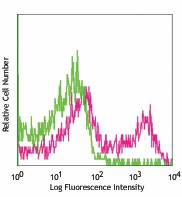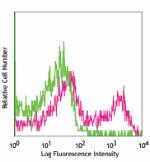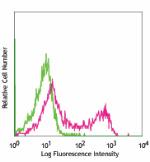- Clone
- OX-17 (See other available formats)
- Regulatory Status
- RUO
- Other Names
- Rat MHC class II
- Isotype
- Mouse IgG1, κ
- Ave. Rating
- Submit a Review
- Product Citations
- publications

-

LOU rat splenocytes stained with purified OX-17, followed by anti-mouse IgG PE
| Cat # | Size | Price | Quantity Check Availability | Save | ||
|---|---|---|---|---|---|---|
| 205401 | 100 µg | £85 | ||||
The OX-17 antibody reacts with a non-polymorphic determinant of rat MHC class II antigen.It is found primarily on the surface of B lymphocytes,macrophages,dendritic cells and other antigen presenting cells.
Product DetailsProduct Details
- Verified Reactivity
- Rat
- Antibody Type
- Monoclonal
- Host Species
- Mouse
- Immunogen
- Wistar rat splenocyte membrane extract
- Formulation
- Phosphate-buffered solution, pH 7.2, containing 0.09% sodium azide.
- Preparation
- The antibody was purified by affinity chromatography.
- Concentration
- 0.5 mg/ml
- Storage & Handling
- The antibody solution should be stored undiluted between 2°C and 8°C.
- Application
-
FC - Quality tested
IHC - Reported in the literature, not verified in house - Recommended Usage
-
Each lot of this antibody is quality control tested by immunofluorescent staining with flow cytometric analysis. For flow cytometric staining, the suggested use of this reagent is ≤ 0.25 µg per 106 cells in 100 µl volume. It is recommended that the reagent be titrated for optimal performance for each application.
-
Application References
(PubMed link indicates BioLegend citation) -
- Mayrhofer G et al. 1983. Eur J Immunol 13:1122. Fukumoto T et al. 1982. Eur J Immunol 12:237
- Product Citations
-
- RRID
-
AB_1134230 (BioLegend Cat. No. 205401)
Antigen Details
- Structure
- The rat MHC class II RT1D is equivalent to mouse I-E antigen. It consists of two chain structure around 28-32 kd, non-covalently linked each other.
- Distribution
- The rat MHC class II antigen is expressed on antigen presenting cells, including B cells, macrophages and dendritic cells.
- Function
- Present antigenic peptide to engage TCR
- Ligand/Receptor
- Presenting antigenic peptide to TCR
- Cell Type
- Antigen-presenting cells, B cells, Macrophages, Dendritic cells
- Biology Area
- Immunology
- Molecular Family
- MHC Antigens
- Antigen References
-
1. Mayrhofer G et al. 1983. Eur J Immunol 13:1122. Fukumoto T et al. 1982. Eur J Immunol 12:237
- Gene ID
- 294270 View all products for this Gene ID
- UniProt
- View information about RT1D on UniProt.org
Other Formats
View All RT1D Reagents Request Custom Conjugation| Description | Clone | Applications |
|---|---|---|
| Purified anti-rat RT1D | OX-17 | FC,IHC |
| FITC anti-rat RT1D | OX-17 | FC |
Compare Data Across All Formats
This data display is provided for general comparisons between formats.
Your actual data may vary due to variations in samples, target cells, instruments and their settings, staining conditions, and other factors.
If you need assistance with selecting the best format contact our expert technical support team.
-
Purified anti-rat RT1D

LOU rat splenocytes stained with purified OX-17, followed b... -
FITC anti-rat RT1D

LOU rat splenocytes stained with OX-17 FITC
 Login / Register
Login / Register 







Follow Us